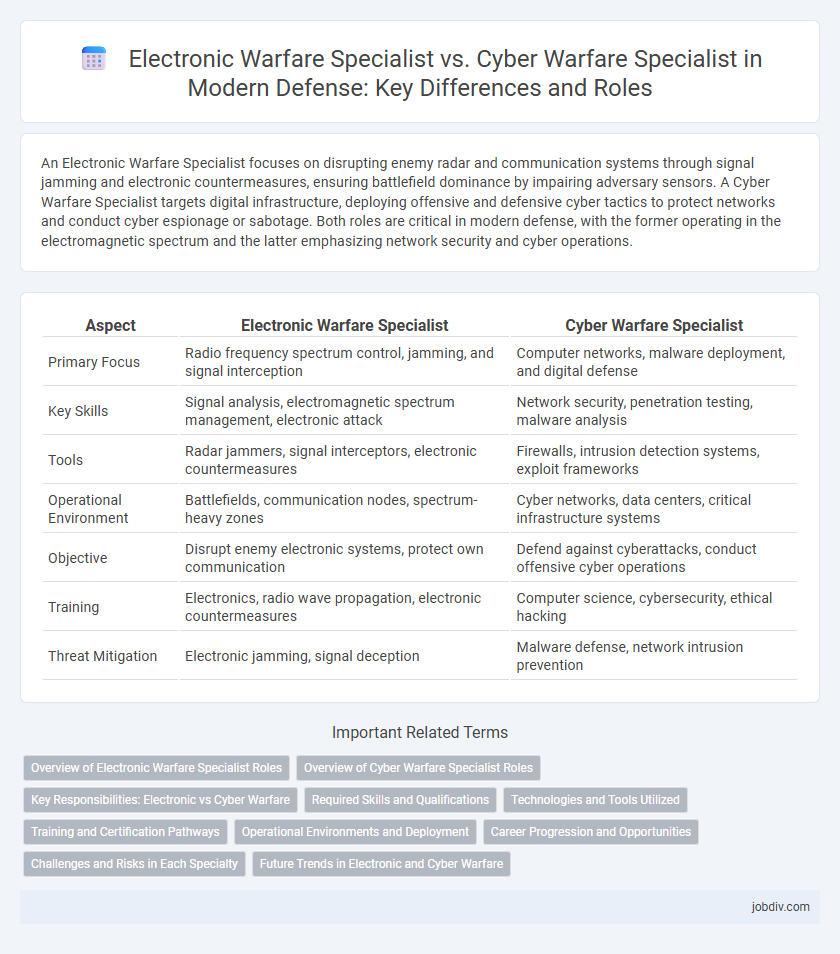An Electronic Warfare Specialist focuses on disrupting enemy radar and communication systems through signal jamming and electronic countermeasures, ensuring battlefield dominance by impairing adversary sensors. A Cyber Warfare Specialist targets digital infrastructure, deploying offensive and defensive cyber tactics to protect networks and conduct cyber espionage or sabotage. Both roles are critical in modern defense, with the former operating in the electromagnetic spectrum and the latter emphasizing network security and cyber operations.
Table of Comparison
| Aspect | Electronic Warfare Specialist | Cyber Warfare Specialist |
|---|---|---|
| Primary Focus | Radio frequency spectrum control, jamming, and signal interception | Computer networks, malware deployment, and digital defense |
| Key Skills | Signal analysis, electromagnetic spectrum management, electronic attack | Network security, penetration testing, malware analysis |
| Tools | Radar jammers, signal interceptors, electronic countermeasures | Firewalls, intrusion detection systems, exploit frameworks |
| Operational Environment | Battlefields, communication nodes, spectrum-heavy zones | Cyber networks, data centers, critical infrastructure systems |
| Objective | Disrupt enemy electronic systems, protect own communication | Defend against cyberattacks, conduct offensive cyber operations |
| Training | Electronics, radio wave propagation, electronic countermeasures | Computer science, cybersecurity, ethical hacking |
| Threat Mitigation | Electronic jamming, signal deception | Malware defense, network intrusion prevention |
Overview of Electronic Warfare Specialist Roles
Electronic Warfare Specialists focus on controlling and disrupting enemy electromagnetic spectrum activities to protect military assets and enhance combat effectiveness. Their roles include signal interception, jamming enemy radar and communications, and safeguarding friendly forces from electronic threats. This specialization requires expertise in radio frequency (RF) systems, signal analysis, and electronic attack and defense techniques essential for battlefield dominance.
Overview of Cyber Warfare Specialist Roles
Cyber Warfare Specialists focus on defending and attacking digital networks through advanced cyber tactics, including threat analysis, penetration testing, and malware deployment. Their role involves developing strategies to protect military communications and critical infrastructure from cyber attacks posed by state and non-state adversaries. They work extensively with encryption, network security protocols, and real-time cyber threat intelligence to maintain operational security and mission success.
Key Responsibilities: Electronic vs Cyber Warfare
Electronic Warfare Specialists focus on disrupting or exploiting adversary electronic signals through jamming, signal interception, and electronic countermeasures to protect friendly communications and radar systems. Cyber Warfare Specialists are responsible for defending networks, conducting offensive cyber operations, and safeguarding critical information infrastructure from cyber threats such as hacking, malware, and data breaches. Both roles require advanced technical expertise but differ in operational domains: electronic spectrum manipulation versus cyberspace security and attack.
Required Skills and Qualifications
Electronic Warfare Specialists must possess expertise in RF spectrum analysis, signal interception, and electronic countermeasure technologies, often requiring advanced knowledge of radar systems and communication protocols. Cyber Warfare Specialists require proficiency in network security, malware analysis, and penetration testing, combined with certifications such as CISSP or CEH to effectively defend against cyber threats. Both roles demand strong analytical abilities and experience with defense-related technologies, but Electronic Warfare leans heavily on hardware and electromagnetic principles, while Cyber Warfare centers on software and digital infrastructure protection.
Technologies and Tools Utilized
Electronic Warfare Specialists employ technologies such as signal jamming devices, radar systems, and electronic countermeasure (ECM) tools to disrupt enemy communications and radar detection. Cyber Warfare Specialists utilize advanced software tools including intrusion detection systems, malware analysis platforms, and encryption technologies to protect and attack digital networks. Both roles integrate artificial intelligence and machine learning to enhance threat detection and response capabilities in electronic and cyber domains.
Training and Certification Pathways
Electronic Warfare Specialists undergo rigorous training in signal intelligence, electromagnetic spectrum operations, and radar systems, with certifications such as Certified Electronic Warfare Professional (CEWP) validating their expertise. Cyber Warfare Specialists focus on network security, offensive and defensive cyber operations, and malware analysis, acquiring certifications like Certified Information Systems Security Professional (CISSP) or Certified Ethical Hacker (CEH). Both fields demand continuous education and hands-on experience to adapt to evolving technological threats and maintain operational readiness.
Operational Environments and Deployment
Electronic Warfare Specialists operate primarily in electromagnetic spectrum environments, executing tasks like signal jamming, radar disruption, and electronic reconnaissance to ensure tactical advantage on the battlefield. Cyber Warfare Specialists focus on digital and network domains, performing cyber defense, offensive cyber operations, and intelligence gathering within information systems and communication networks. Deployment for Electronic Warfare typically involves proximity to combat zones with specialized equipment on aircraft, ships, or ground vehicles, whereas Cyber Warfare operations are often conducted remotely or from secure command centers with access to global networks.
Career Progression and Opportunities
Electronic Warfare Specialists advance through roles emphasizing signal interception, electronic attack, and countermeasure development, often progressing to positions in tactical operations and systems management within military branches. Cyber Warfare Specialists follow a career path centered on network defense, threat analysis, and offensive cyber operations, with opportunities to lead cyber security teams and develop national cyber defense strategies. Both fields offer growth in technical expertise and strategic leadership, with Cyber Warfare roles increasingly expanding due to rising global cyber threats and technological reliance.
Challenges and Risks in Each Specialty
Electronic Warfare Specialists face challenges including signal interception complexities, electromagnetic spectrum management, and vulnerability to physical countermeasures. Cyber Warfare Specialists encounter risks from sophisticated cyberattacks, zero-day vulnerabilities, and rapidly evolving malware targeting critical defense infrastructure. Both specialties require continuous adaptation to emerging threats and integration of advanced technologies to maintain operational superiority.
Future Trends in Electronic and Cyber Warfare
Future trends in electronic warfare emphasize advanced signal intelligence, automated jamming systems, and AI-driven electronic attack capabilities to disrupt enemy sensors and communications. Cyber warfare specialists are focusing on quantum-resistant encryption, AI-powered threat detection, and offensive cyber operations to safeguard critical infrastructure and exploit adversary networks. Integration of electronic and cyber warfare tactics is evolving, enhancing multi-domain operations with real-time data sharing and coordinated defense mechanisms.
Electronic Warfare Specialist vs Cyber Warfare Specialist Infographic

 jobdiv.com
jobdiv.com